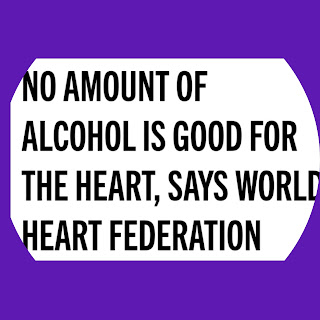🤷WHAT AMOUNT OF ALCOHOL IS GOOD FOR YOUR HEART 🤷
🤷WHAT AMOUNT OF ALCOHOL IS GOOD FOR YOUR HEART 🤷
In a new policy brief, the World Heart Federation (WHF) is challenging the widespread notion that drinking moderate amounts of alcohol can decrease the risk of heart disease, and calling for urgent and decisive action to tackle the unprecedented rise in alcohol-related death and disability worldwide.
In 2019, more than 2.4 million people died because of alcohol, accounting for 4.3% of all deaths globally and 12.6% of deaths in men aged 15 to 49. Alcohol is a psychoactive and harmful substance that can cause significant damage to the human body. Its consumption is a major avoidable risk factor for noncommunicable diseases, including cardiovascular disease, cancer, digestive diseases, and intentional and unintentional injuries, and for several infectious diseases.
The evidence is clear: any level of alcohol consumption can lead to loss of healthy life. Studies have shown that even small amounts of alcohol can increase a person’s risk of cardiovascular disease, including coronary disease, stroke, heart failure, hypertensive heart disease, cardiomyopathy, atrial fibrillation, and aneurysm. Studies that claim otherwise are based on purely observational research, which fails to account for other factors, such as pre-existing conditions and a history of alcoholism in those considered to be “abstinent”. To date, no reliable correlation has been found between moderate alcohol consumption and a lower risk of heart disease.
“The portrayal of alcohol as necessary for a vibrant social life has diverted attention from the harms of alcohol use, as have the frequent and widely publicised claims that moderate drinking, such as a glass of red wine a day, can offer protection against cardiovascular disease.” said Monika Arora, Member of the WHF Advocacy Committee and co-author of the brief. “These claims are at best misinformed and at worst an attempt by the alcohol industry to mislead the public about the danger of their product.”
The economic and social costs of alcohol are also significant: they include the cost to health systems, out of pocket expenditure, and productivity losses, as well as the increased risk of violence, homelessness, and criminal activity. Alcohol has a greater impact on people from low socio-economic backgrounds, who are more likely to experience its adverse effects compared to people from higher socio-economic backgrounds, even when consuming similar or lower amounts.
Like, comment and share
Follow us on YouTube now at check your health and maintain your wealth
Visit us if you're in Bamenda or Buea
WatsApp 00237666006107


Comments
Post a Comment